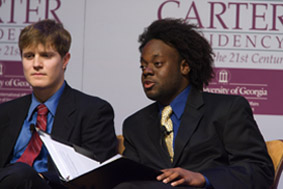 |
Yannick Morgan, right, and Ben Cobb, Foundation Fellow, during the student panel. |
Cox Center Research Clerk Yannick Morgan Offers Advice in President Carter Symposium
On stage left sat former President Jimmy Carter. To Carter’s right sat a panel of six University of Georgia students prepared to deliver several lectures pertaining to the symposium theme, “Lessons Learned: Policy Advice for the 21st Century.”
The students were selected from the entire university to make these presentations. Guests, in addition to Carter, included such prominent figures as former First Lady Rosalynn Carter, former Vice President Walter Mondale and former Secretary of State Madeleine Albright.
All were attending the symposium hosted by the University of Georgia from Jan. 19-21 to celebrate the 30th anniversary of President Carter’s inauguration and to reflect on lessons learned during his presidency and in the 21st century.
Among the students, and sitting on stage right, was Yannick Morgan, an undergraduate research clerk in the James M. Cox Jr. Center for International Mass Communication Training and Research and a fourth-year student majoring in international affairs.
Morgan spoke about nuclear non-proliferation efforts during the Carter administration and those underway at the time of the symposium with North Korea and Iran. Morgan advised direct talks be held with North Korea. He also called for a improved cultural exchanges between America and Iran along with “an increase of American civilians in Persian and Arab countries giving Americans a better understanding of the group across the negotiating table.”
Morgan pointed to problems in the past with nuclear proliferation, including loopholes in nuclear fuel transactions that enabled India to obtain nuclear weaponry. He offered cautious advice, saying that in the future “the U.S. must ensure that all states with which it trades dual-use items and technologies have in place comprehensive safeguards and inspection systems.”
Morgan pointed to cultural differences that led to problems in nuclear negotiations with the Soviet Union during the Carter administration. He said that lessons in the past show that “the U.S. must make greater efforts to understand the cultural and security identities of the states with which it wishes to negotiate.”
Academics whose research focuses on Carter, journalists and members of his administration shared experiences about the Carter presidency at the symposium, held at the University’s Georgia Center for Continuing Education Conference Center. The symposium was organized by the School of Public and International Affairs and the Carl Vinson Institute of Government.
Morgan, a citizen of Sierra Leone who grew up in Tampa, Florida, works in the Cox Center on a variety of research projects. He is a participant in the University’s Honors Program and a recipient of the UGA Foundation Fellowship.
The six student presenters at the symposium were selected from 26 initially invited to be part of the program. These students organized into groups to produce policy papers for presentation. Morgan’s team was presenting on Nuclear Nonproliferation. Other topics covered by the students were Economic Policy, Energy Policy, Islamic Fundamentalism, The Middle East and Human Rights.
The Cox Center is a unit of the Grady College of Journalism and Mass Communication at the University of Georgia.

